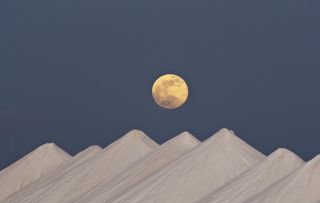Blood Moon Tunes: Music to Make Your 'Supermoon' Lunar Eclipse Rock

As you settle in Sunday night (Sept. 27) to watch the supermoon lunar eclipse, kick back with some moon tunes as chosen by Space.com's staff.
The moon has always fascinated humans, ever present and ever changing in the sky, and that fascination has inspired countless moon-based melodies. A full moon can mean romance or chaos and disaster; a thin silver sliver spells mystery, changeability or tranquility. What might a supermoon lunar eclipse represent?
Listen below to some moon favorites:

The infographic pulls out classic moon tunes, songs about the Apollo moon missions, and even songs for a rainbow of multicolored moons (from "Red Moon" by The Walkmen down to "Kiko and the Lavender Moon" by Los Lobos). It also includes songs for geographical moons rising over dozens of American states, plus Australia ("Sorrento Moon" by Tina Arena) and Cuba ("Havana Moon" by Chuck Berry).
To prepare for Sunday's eclipse, check out Space.com's viewing guide or catch up on the science behind it. The moon won't completely disappear — it will take on a reddish hue after it falls into Earth's shadow. The total eclipse will begin at 8:11 p.m. EDT (0011 GMT on Sept. 28) and stretch for 72 minutes. So if you're in it for the long haul, you'll have plenty of time for a lunar playlist.

Editor's note: If you capture an amazing view of the supermoon lunar eclipse or any other night sky view that you would like to share with Space.com for a possible story or gallery, send images and comments to managing editor Tariq Malik at: spacephotos@space.com.
Email Sarah Lewin at slewin@space.com or follow her @SarahExplains. Follow us @Spacedotcom, Facebook and Google+. Original article on Space.com.
Get the Space.com Newsletter
Breaking space news, the latest updates on rocket launches, skywatching events and more!
Join our Space Forums to keep talking space on the latest missions, night sky and more! And if you have a news tip, correction or comment, let us know at: community@space.com.

Sarah Lewin started writing for Space.com in June of 2015 as a Staff Writer and became Associate Editor in 2019 . Her work has been featured by Scientific American, IEEE Spectrum, Quanta Magazine, Wired, The Scientist, Science Friday and WGBH's Inside NOVA. Sarah has an MA from NYU's Science, Health and Environmental Reporting Program and an AB in mathematics from Brown University. When not writing, reading or thinking about space, Sarah enjoys musical theatre and mathematical papercraft. She is currently Assistant News Editor at Scientific American. You can follow her on Twitter @SarahExplains.
